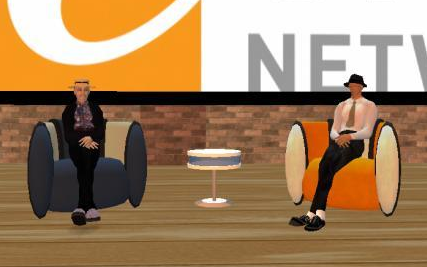Author of "Smart Mobs" says Second Life numbers aren't important


I've just 'teleported' out of Second Life where I was in the audience 'listening' to Daniel Terdiman's interview with Howard Rheingold (author of Smart Mobs), conducted in CNET's virtual conference room.
Commenting on the recent debate surrounding Linden Labs' inflated user numbers for Second Life, Rheingold said:
I like the Darwinian nature of the blogosphere -- there's always someone who can keep you honest. And ten years ago, I had an online community 'dotcom' so I know the numbers game is kinda bogus.
I read something yesterday -- can't recall where -- that noted that journalists are barking up the wrong tree with the numbers game. SL is a playground for early adopters. As far as I am concerned, tens of thousands of people who are actively creating new stuff is more interesting than millions of more passive participants.
He then went on to talk about how online communities have changed over the years (or haven't):
Some things about online social behavior seems to be eternal and universal... Trolls and griefers, eternal meta-debate about what to do about them, for example. There's a widespread amnesia, as if these kinds of cybersocializing were new... not many people online have much sense of history. That's probably true of just about everything.
But the tools for creating and participating in online communities have become more accessible:
What I really like is that it's so easy to roll your own these days. It used to be a big deal to set up your own chat or BBS or listserv. Now it's part of the toolset for millions of people, and it's mostly free. My main concern has always been about the quality of online discourse -- are we improving or degrading the public sphere?
So how do you improve the level of discourse? The answer, says Rheingold, is education:
In the olden days, Usenet veterans would teach netiquette to newcomers. Every September, jillions of new college students would come online and people would take time to educate them -- not always gently. But then AOL dumped 3 million people on the Net without instruction and it became the September that never ended. I personally think that the importance of online discourse ought to be taught in high school, but public education changes slowly. My latest effort is at socialtext.net/medialiteracy. I'm trying to find some funding to set up after school and summer programs to teach participatory media as an avenue to civic engagement about issues that young people care about.
And what about Time magazine naming 'you' as the person of the year:
... it mainstreams (the idea of) commons based peer production, which is way too stuffy a term for most people. The idea that people only act for profit is pernicious and outmoded. Sometimes, self-interest adds up to more for everyone. And sometimes, if it's easy enough, most people will do things for altruistic purposes.The research on open source production seems to indicate that a mixture of motives is necessary for creating public goods like open source software, wikipedia, etc. Reputation, profit, learning, fun, altruism...
Profit is in there, for sure. It's just not the ONLY motivation.
Related post: Second Life: Don’t believe the hype